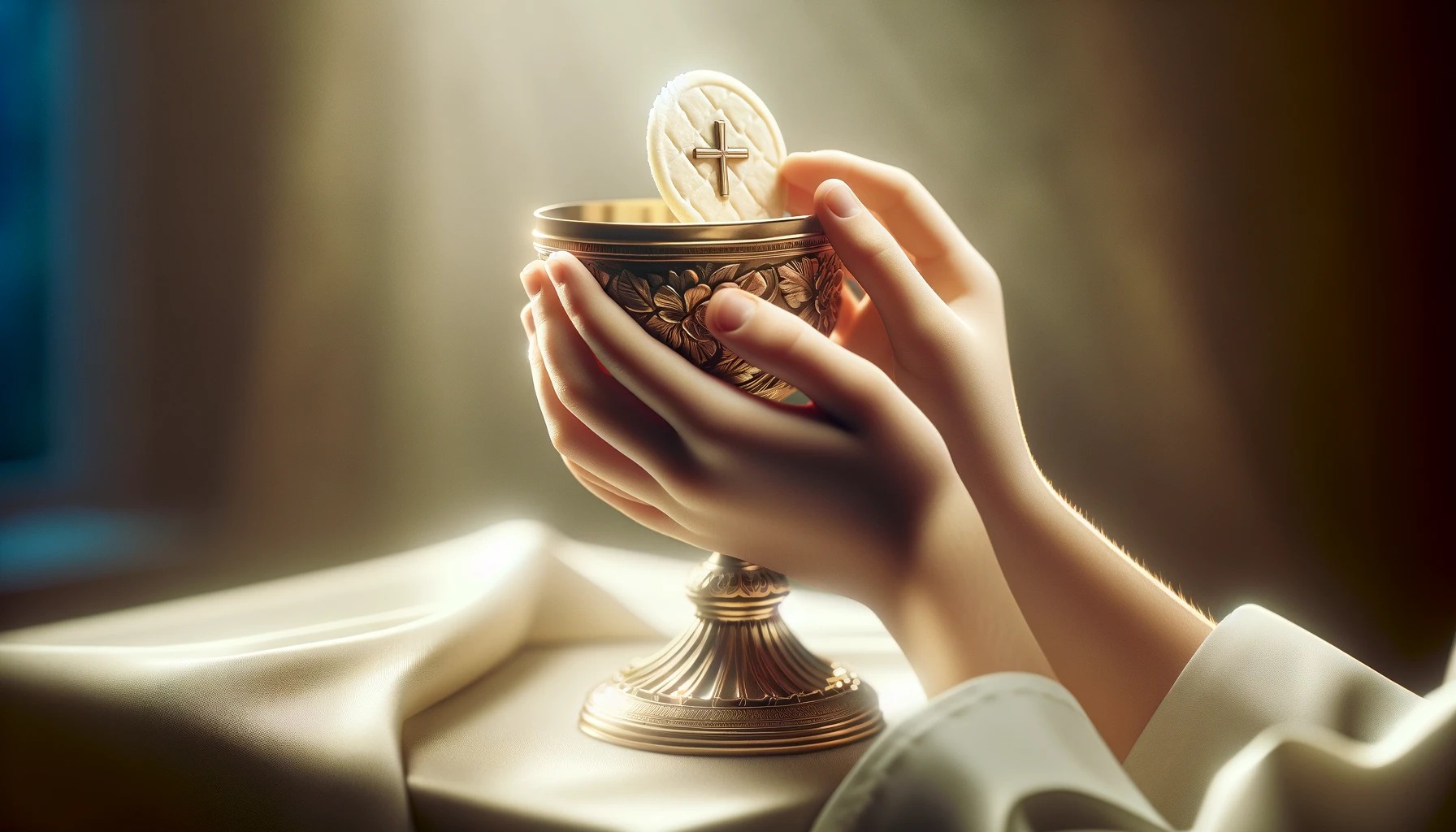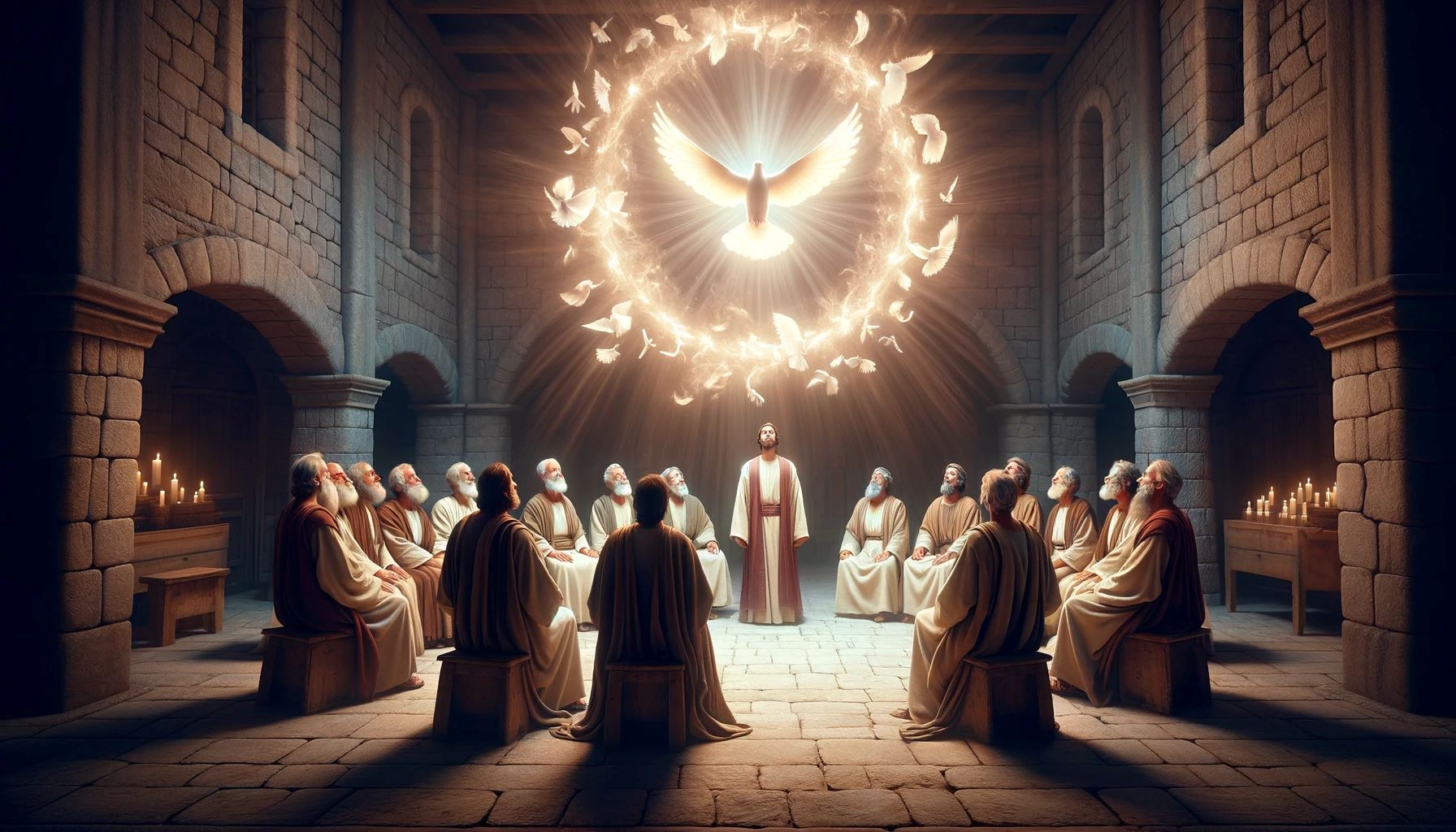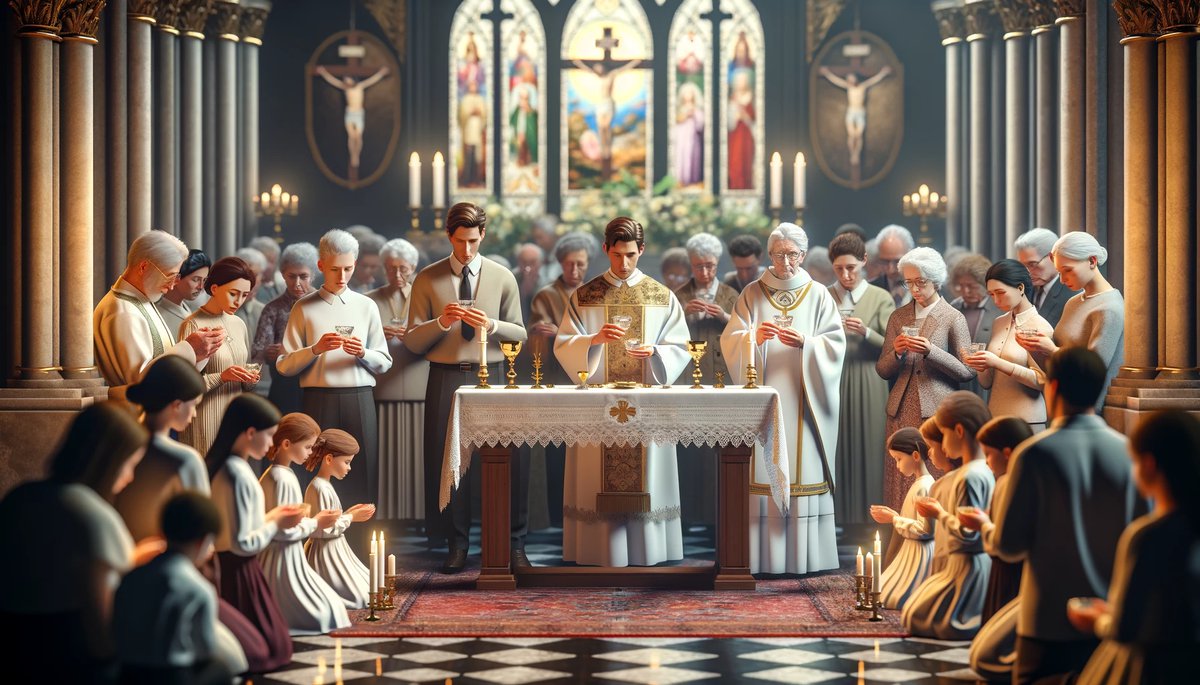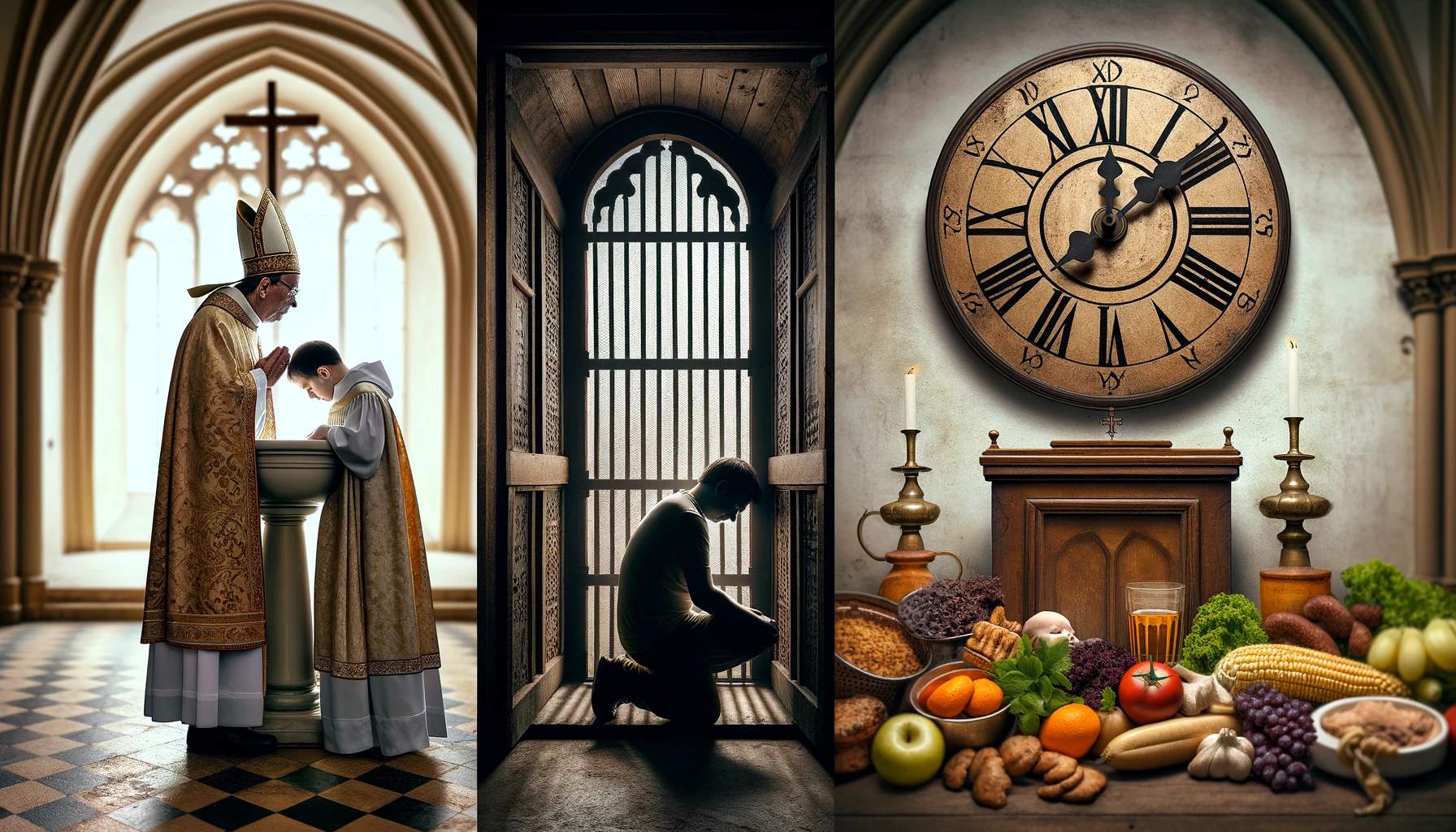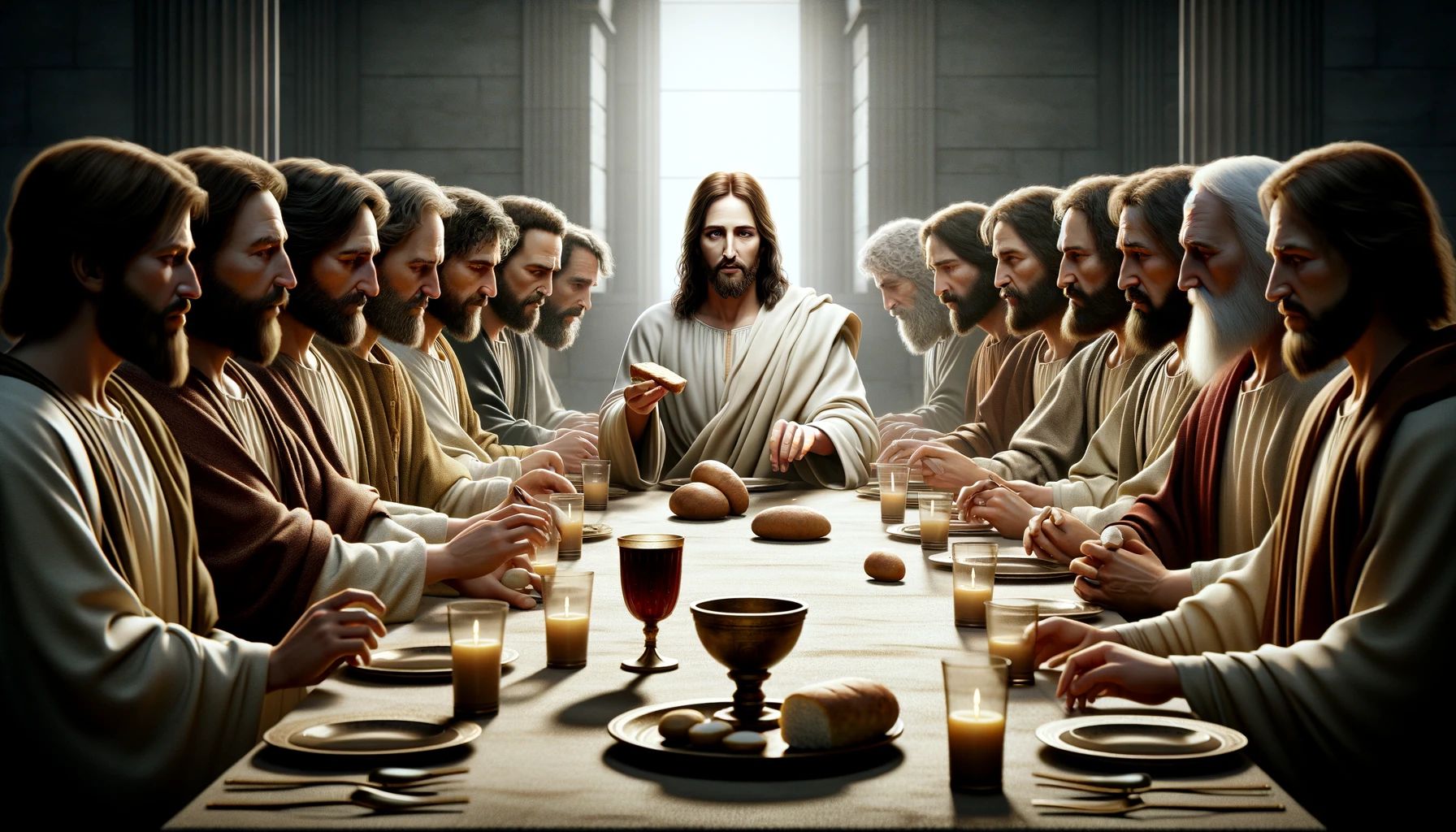Home>Theology and Spirituality>What Happens In A Holy Communion
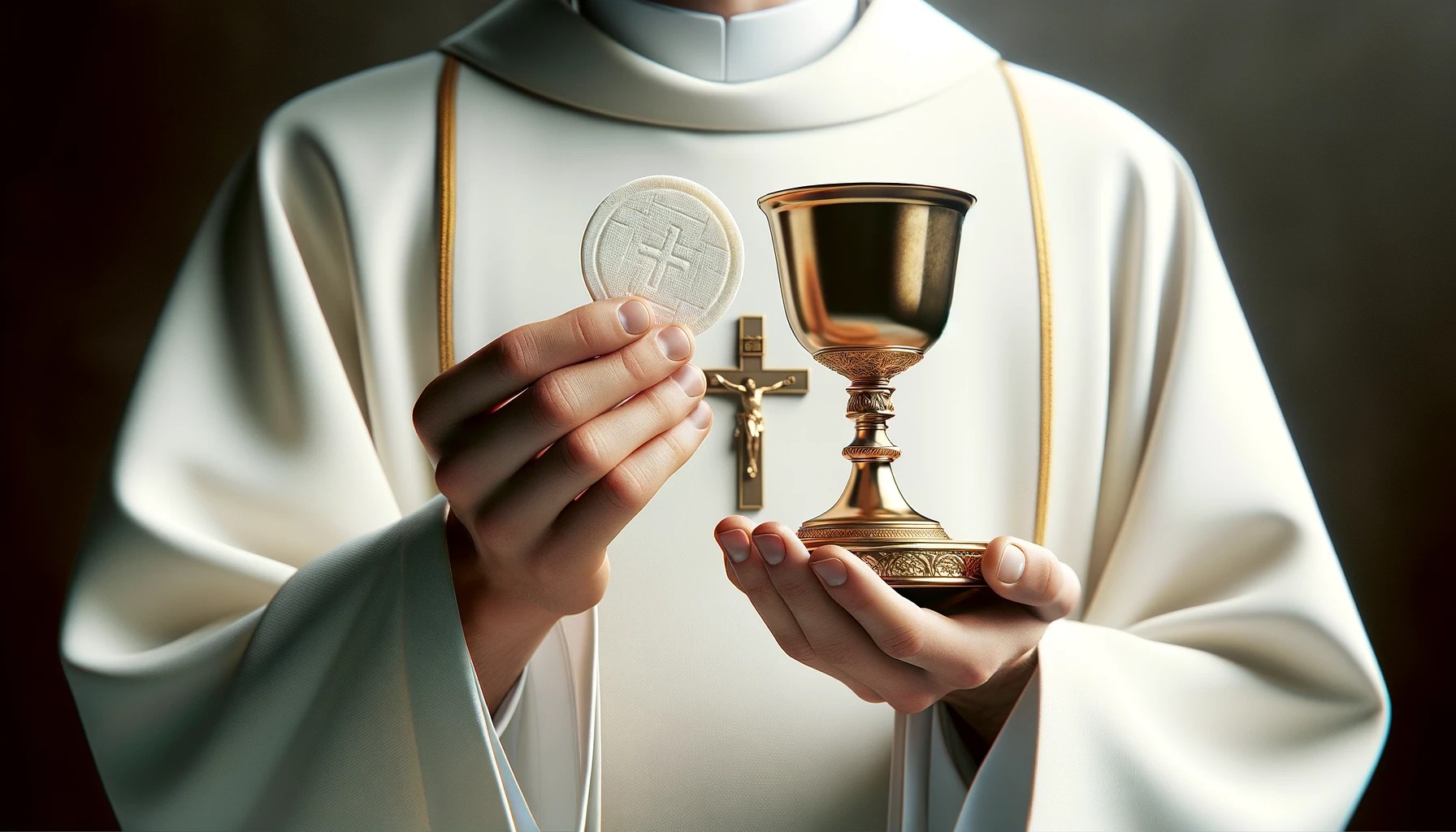

Theology and Spirituality
What Happens In A Holy Communion
Published: February 24, 2024
Ericka Andersen, an editor at Christian.net, expertly merges digital strategy with content creation, focusing on faith and societal issues. Her communication skills enhance the platform's engaging narratives, fostering meaningful dialogue on belief's impact on society.
Discover the significance and rituals of Holy Communion in theology and spirituality. Explore the spiritual and religious aspects of this sacred practice.
(Many of the links in this article redirect to a specific reviewed product. Your purchase of these products through affiliate links helps to generate commission for Christian.net, at no extra cost. Learn more)
Table of Contents
Introduction
Holy Communion, also known as the Eucharist or the Lord's Supper, holds a central place in Christian worship and spirituality. It is a sacred ritual that symbolizes the core beliefs of the Christian faith and serves as a profound expression of unity, remembrance, and spiritual nourishment for believers. The act of partaking in Holy Communion is deeply rooted in the teachings of Jesus Christ and has been practiced by Christians for centuries.
This article aims to explore the significance, history, and elements of Holy Communion, shedding light on its spiritual and theological importance within the Christian tradition. By delving into the meaning, process, and diverse interpretations of this sacred practice, we can gain a deeper understanding of its role in the lives of believers and the various Christian denominations.
As we embark on this journey to unravel the profound mysteries and rich traditions surrounding Holy Communion, we will discover the timeless relevance of this sacred sacrament and its enduring impact on the spiritual lives of countless individuals around the world. Join us as we delve into the heart of Holy Communion, exploring its profound symbolism, historical evolution, and enduring significance in the Christian faith.
Read more: What Happens In Holy Communion
The Meaning of Holy Communion
At its core, Holy Communion represents a sacred and symbolic reenactment of the Last Supper, a pivotal event in the life of Jesus Christ. During this final meal with his disciples, Jesus instituted the practice of sharing bread and wine as a way to commemorate his impending sacrifice on the cross. This act of sharing the bread and wine, which Jesus identified as his body and blood, serves as a profound metaphor for the spiritual nourishment and atonement offered through his impending crucifixion.
Holy Communion holds deep spiritual significance for Christians, embodying the central tenets of their faith. The bread symbolizes the body of Christ, broken for the redemption of humanity, while the wine represents his blood, shed for the forgiveness of sins. Through partaking in the elements of bread and wine, believers symbolically unite with the sacrificial act of Jesus, acknowledging his redemptive work on the cross and expressing their faith in his atoning sacrifice.
Furthermore, Holy Communion serves as a powerful expression of unity within the Christian community. As believers partake in the sacrament together, they affirm their shared identity as members of the body of Christ, transcending individual differences and coming together in fellowship and spiritual communion. This act of communal participation underscores the interconnectedness of believers and reinforces the bonds of love, compassion, and mutual support within the Christian community.
In essence, Holy Communion encapsulates the profound spiritual truths of redemption, atonement, and unity within the Christian faith. It serves as a tangible and transformative expression of the foundational beliefs of Christianity, inviting believers to partake in a sacred ritual that embodies the enduring presence and redemptive work of Jesus Christ. As such, Holy Communion stands as a poignant and deeply meaningful practice that continues to shape the spiritual lives of Christians across denominational boundaries, offering a tangible connection to the profound mysteries of faith and the enduring love of God.
The History of Holy Communion
The history of Holy Communion can be traced back to the Last Supper, a momentous event in the life of Jesus Christ. According to the Gospels, during the Passover meal, Jesus shared bread and wine with his disciples, imparting profound significance to these elements. He instructed his followers to partake in the bread, signifying his body, and the wine, symbolizing his blood, as a means of remembering him. This act of sharing a communal meal imbued with spiritual symbolism laid the foundation for the ritual of Holy Communion.
In the early Christian community, the practice of Holy Communion, or the Eucharist, evolved as a central component of worship and spiritual fellowship. The apostle Paul, in his first letter to the Corinthians, provided insights into the celebration of the Lord's Supper within the early Christian gatherings. He emphasized the solemn and reverent nature of partaking in the bread and wine, underscoring the profound significance of this act of remembrance and spiritual communion.
As Christianity spread and diversified, various traditions and liturgical practices surrounding Holy Communion emerged. The early church fathers, such as Ignatius of Antioch and Justin Martyr, offered valuable insights into the theological and liturgical aspects of the Eucharist, emphasizing its role as a sacred and transformative rite within the Christian community.
Throughout the centuries, the understanding and practice of Holy Communion underwent theological reflections and doctrinal developments within different Christian traditions. The theological concepts of transubstantiation, consubstantiation, and symbolic memorialism contributed to diverse interpretations of the nature of the bread and wine in relation to the body and blood of Christ.
The Protestant Reformation brought about significant changes in the understanding and practice of Holy Communion. Reformers such as Martin Luther, John Calvin, and Ulrich Zwingli offered distinct perspectives on the Eucharist, leading to the emergence of various Protestant traditions with unique liturgical expressions of the Lord's Supper.
In contemporary times, Holy Communion continues to hold a central place in Christian worship, serving as a sacred and unifying practice across denominational lines. The rich historical tapestry of Holy Communion reflects its enduring significance as a timeless ritual that encapsulates the foundational truths of the Christian faith and fosters spiritual nourishment, unity, and remembrance within the Christian community.
The Elements of Holy Communion
The elements of Holy Communion, namely bread and wine, hold profound symbolic significance within the Christian tradition. These tangible elements serve as powerful metaphors for the body and blood of Jesus Christ, embodying the central tenets of redemption, atonement, and spiritual nourishment.
Bread
The bread used in Holy Communion symbolizes the body of Christ, broken for the redemption of humanity. This imagery harks back to the Last Supper, where Jesus took bread, blessed it, and gave it to his disciples, declaring, "This is my body, which is given for you" (Luke 22:19). The act of breaking the bread signifies the sacrificial nature of Christ's body, offered for the forgiveness of sins and the reconciliation of humanity with God. As believers partake in the bread, they symbolically unite with the redemptive work of Jesus, acknowledging his selfless sacrifice on the cross and expressing their faith in his transformative power.
Read more: What Is Holy Communion?
Wine
The wine, or the fruit of the vine, represents the blood of Christ, shed for the forgiveness of sins. During the Last Supper, Jesus took the cup of wine, gave thanks, and offered it to his disciples, saying, "This cup that is poured out for you is the new covenant in my blood" (Luke 22:20). The symbolism of the wine as the blood of Christ underscores the profound atoning nature of his sacrifice, signifying the establishment of a new covenant between God and humanity. As believers partake in the wine, they symbolically participate in the spiritual nourishment and forgiveness made possible through the shedding of Christ's blood, reaffirming their commitment to the redemptive message of the Gospel.
The elements of bread and wine in Holy Communion serve as tangible reminders of the foundational truths of the Christian faith, inviting believers to partake in a sacred ritual that embodies the enduring presence and redemptive work of Jesus Christ. Through the act of partaking in these elements, believers engage in a transformative expression of their faith, finding spiritual nourishment, unity, and remembrance in the timeless ritual of Holy Communion.
The Process of Holy Communion
The process of Holy Communion unfolds as a sacred and reverent ritual within the Christian worship setting, encompassing distinct stages that imbue the experience with profound spiritual significance and communal unity.
Preparation
Before the commencement of Holy Communion, the clergy and liturgical assistants engage in meticulous preparations to ensure the solemn and reverent observance of this sacred rite. This may involve the arrangement of the communion table, the placement of the bread and wine, and the adornment of the sacred vessels. Additionally, prayers and liturgical readings may set the tone for the upcoming act of partaking in the Eucharistic elements, creating an atmosphere of reverence and spiritual anticipation.
Invitation and Confession
The congregation is invited to approach the communion table, typically in an orderly manner, as a gesture of readiness to partake in the sacred elements. Prior to receiving the bread and wine, a moment of confession and reconciliation may take place, allowing individuals to reflect on their spiritual state and seek God's forgiveness and renewal. This introspective phase underscores the transformative nature of Holy Communion, inviting participants to approach the table with humility and contrition.
Read more: What Happens During The Communion Rite
Blessing and Sharing
As the congregation gathers around the communion table, the presiding clergy offers prayers of consecration, invoking the presence of the Holy Spirit to sanctify the bread and wine. This act of blessing signifies the sacred transformation of the ordinary elements into the spiritual symbols of Christ's body and blood. The clergy then shares the consecrated bread, often accompanied by solemn words of remembrance and thanksgiving, inviting the participants to partake in the symbolic representation of Christ's body. Subsequently, the sharing of the cup, symbolizing the blood of Christ, follows suit, further deepening the spiritual communion and collective remembrance of Christ's sacrificial love.
Communal Participation and Reflection
As the congregation partakes in the bread and wine, a profound sense of communal participation and spiritual unity permeates the atmosphere. The act of sharing in the Eucharistic elements serves as a tangible expression of the believers' shared identity as members of the body of Christ, transcending individual differences and fostering a deep sense of spiritual interconnectedness. This communal participation is often accompanied by moments of silent reflection, prayer, and gratitude, allowing individuals to internalize the profound significance of the sacramental experience and its transformative impact on their spiritual journey.
Sending Forth
Following the partaking of the Eucharistic elements, the congregation may be sent forth with a benediction, carrying the spiritual nourishment and unity experienced during Holy Communion into their daily lives. This sending forth encapsulates the culmination of the sacred ritual, empowering the participants to embody the transformative message of Christ's love and grace as they engage with the world beyond the worship space.
The process of Holy Communion, with its meticulous preparations, solemn invitation, communal sharing, and reflective sending forth, encapsulates the profound spiritual journey of remembrance, unity, and transformative grace within the Christian tradition. As believers engage in this sacred process, they are invited to partake in a timeless ritual that embodies the enduring presence and redemptive work of Jesus Christ, fostering spiritual nourishment, unity, and remembrance within the Christian community.
The Significance of Holy Communion
The significance of Holy Communion within the Christian tradition extends far beyond a mere ritualistic practice; it embodies profound spiritual, theological, and communal significance that resonates deeply with believers. At its core, Holy Communion serves as a tangible expression of the foundational truths of the Christian faith, encapsulating the redemptive work of Jesus Christ, fostering spiritual nourishment, and fostering unity within the Christian community.
First and foremost, Holy Communion stands as a poignant symbol of remembrance and spiritual nourishment. As believers partake in the bread and wine, they engage in a sacred ritual that serves as a tangible reenactment of the Last Supper, where Jesus instituted the practice as a means of commemorating his impending sacrifice on the cross. The act of partaking in the elements of bread and wine symbolically unites believers with the sacrificial act of Jesus, inviting them to remember and internalize the profound significance of his redemptive work. This act of remembrance not only honors the sacrifice of Christ but also serves as a source of spiritual nourishment, offering believers a tangible connection to the enduring presence and transformative grace of Jesus Christ.
Furthermore, Holy Communion embodies the theological concept of unity and communal participation within the Christian community. As believers gather around the communion table to partake in the Eucharistic elements, they affirm their shared identity as members of the body of Christ, transcending individual differences and coming together in fellowship and spiritual communion. This act of communal participation underscores the interconnectedness of believers and reinforces the bonds of love, compassion, and mutual support within the Christian community. Through the shared experience of Holy Communion, believers find a profound sense of unity and spiritual interconnectedness, fostering a deep sense of communal belonging and shared faith.
Moreover, Holy Communion serves as a transformative and deeply personal experience for individuals, offering a sacred space for introspection, renewal, and spiritual communion with God. As believers partake in the Eucharistic elements, they are invited to reflect on their spiritual journey, seek reconciliation, and experience the transformative grace of Christ's redemptive love. This introspective aspect of Holy Communion fosters a deep sense of spiritual renewal and personal connection with the divine, allowing individuals to encounter the transformative power of Christ's sacrificial love in a tangible and profound manner.
In essence, the significance of Holy Communion encompasses the profound spiritual truths of remembrance, unity, and transformative grace within the Christian tradition. This sacred ritual continues to shape the spiritual lives of believers, offering a tangible connection to the enduring presence and redemptive work of Jesus Christ. As such, Holy Communion stands as a poignant and deeply meaningful practice that fosters spiritual nourishment, unity, and remembrance within the Christian community, inviting believers to partake in a timeless ritual that embodies the enduring significance of the Christian faith.
Read more: What Is The Symbol Of Holy Communion
The Role of Holy Communion in Different Christian Denominations
Holy Communion, known by various names such as the Eucharist, the Lord's Supper, or the Sacrament of the Altar, holds a central place in the worship and spiritual life of diverse Christian denominations. While the core theological significance of Holy Communion remains consistent across denominational boundaries, the specific practices, beliefs, and interpretations surrounding this sacred ritual exhibit notable variations within different Christian traditions.
In the Roman Catholic Church, Holy Communion is regarded as a central sacrament, often referred to as the "source and summit" of the Christian life. Catholics believe in the doctrine of transubstantiation, wherein the bread and wine are believed to undergo a metaphysical transformation into the actual body and blood of Christ during the Eucharistic celebration. The act of receiving the Eucharist is considered a deeply sacred and transformative experience, fostering spiritual nourishment and unity with Christ and the Church.
Within the Eastern Orthodox tradition, Holy Communion, or the Divine Liturgy, occupies a central role in the liturgical and spiritual life of believers. Orthodox Christians hold a robust sacramental theology, emphasizing the mystical and transformative nature of the Eucharist. The act of partaking in the Eucharistic elements is viewed as a profound encounter with the living Christ, fostering spiritual renewal and unity with the divine. The Orthodox Church places great emphasis on the reverent and solemn celebration of the Eucharist, reflecting the rich theological and liturgical heritage of the Eastern Christian tradition.
In Anglican and Episcopal traditions, Holy Communion, often referred to as the Holy Eucharist, holds a central place in worship, embodying the spiritual nourishment and communal unity of believers. Anglicans maintain a diverse theological spectrum regarding the nature of the Eucharistic elements, encompassing beliefs ranging from a real presence of Christ to a symbolic memorialism. The celebration of the Eucharist in Anglican worship is characterized by its liturgical richness and reverence, reflecting a balance of ancient traditions and contemporary expressions of faith.
Among Protestant denominations, the understanding and practice of Holy Communion exhibit notable diversity. Lutherans uphold the doctrine of the real presence of Christ in the Eucharist, emphasizing the spiritual nourishment and forgiveness offered through the sacramental elements. Reformed traditions, including Presbyterian and Congregationalist churches, hold varying perspectives on the Eucharist, often emphasizing its symbolic and commemorative nature while underscoring its role as a means of spiritual nourishment and communal remembrance.
In contemporary evangelical and non-denominational Christian communities, Holy Communion is often celebrated as a deeply meaningful and personal act of remembrance and spiritual communion. These traditions may exhibit diverse practices and interpretations regarding the frequency and significance of the Eucharistic celebration, reflecting a range of theological perspectives and liturgical expressions within the broader evangelical landscape.
In summary, the role of Holy Communion in different Christian denominations encompasses a rich tapestry of theological beliefs, liturgical practices, and spiritual significance. While the core themes of remembrance, unity, and spiritual nourishment remain central across denominational lines, the diverse expressions of the Eucharistic celebration reflect the multifaceted nature of Christian worship and spirituality within the rich tapestry of the global Christian community.
Conclusion
In conclusion, Holy Communion stands as a timeless and profound sacrament that embodies the enduring significance of the Christian faith. From its origins in the Last Supper to its diverse expressions within different Christian denominations, Holy Communion encapsulates the foundational truths of remembrance, unity, and transformative grace. The act of partaking in the bread and wine serves as a tangible reenactment of Jesus Christ's sacrificial love, inviting believers to remember and internalize the profound significance of his redemptive work.
Throughout history, Holy Communion has served as a unifying force within the Christian community, fostering a deep sense of communal participation and spiritual interconnectedness. The ritual transcends individual differences, inviting believers to gather around the communion table as members of the body of Christ, reaffirming their shared identity and faith. This communal aspect of Holy Communion underscores the enduring bonds of love, compassion, and mutual support within the Christian community, fostering a profound sense of belonging and shared spiritual journey.
Moreover, Holy Communion offers believers a sacred space for introspection, renewal, and spiritual communion with God. As individuals partake in the Eucharistic elements, they are invited to reflect on their spiritual journey, seek reconciliation, and experience the transformative grace of Christ's redemptive love. This introspective dimension of Holy Communion fosters a deep sense of spiritual renewal and personal connection with the divine, allowing individuals to encounter the transformative power of Christ's sacrificial love in a tangible and profound manner.
In essence, Holy Communion continues to shape the spiritual lives of believers, offering a tangible connection to the enduring presence and redemptive work of Jesus Christ. It serves as a poignant and deeply meaningful practice that fosters spiritual nourishment, unity, and remembrance within the Christian community. As believers partake in this timeless ritual, they are invited to embody the transformative message of Christ's love and grace, carrying the spiritual nourishment and unity experienced during Holy Communion into their daily lives.
Ultimately, Holy Communion stands as a sacred bridge between the earthly and the divine, inviting believers to partake in a timeless ritual that embodies the enduring significance of the Christian faith. It remains a source of spiritual nourishment, communal unity, and transformative grace, continuing to enrich the lives of countless individuals across the diverse tapestry of the global Christian community.
